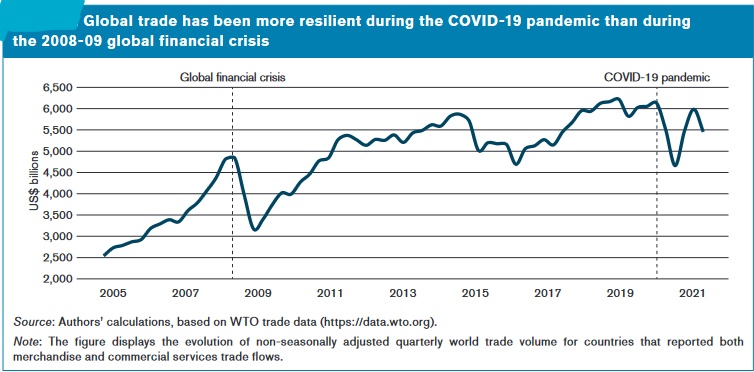
Research and Analysis
The World Trade Report 2021 shows that due to its interconnected nature, international trade can bolster economic resilience
Geneva: The health and economic crisis caused by the COVID-19 pandemic has been a massive stress test of the world trading system, delivering unprecedented shocks to global supply chains and trade relations among countries. In 2020, the value of global trade in goods and services in nominal dollar terms fell by 9.6 per cent, while global GDP fell by 3.3 per cent, in the most severe recession since World War II.
However, the trading system has proved itself more resilient than many expected at the outset of the crisis. Although initially the pandemic severely disrupted international trade flows, supply chains have rapidly adapted, goods have continued to flow across borders, and many economies have gradually begun to recover.
During the COVID-19 crisis, despite some pandemic-related export restrictions, trade helped countries meet the skyrocketing demand for medical products. In 2020, even as the value of global trade declined by 7.6 percent, trade in medical supplies grew by 16 per cent. Trade in personal protective equipment increased by nearly 50 per cent – and by 480 per cent for the textile face masks that have become so familiar to all of us. Trade in agricultural products remained stable in 2020, preventing the health crisis from becoming a food crisis.
Also read: Despite regional divergences, global trade rebound beats expectations

The COVID-19 pandemic and the prospect of increasingly frequent and more intense natural and man-made disasters raise important questions about the resilience of the global economy to such shocks. The challenges ahead are many and varied. These include climate change, which is driving increases in extreme weather events, such as droughts, cyclones and floods, human encroachment on animal habitats, which can increase the risks of spreading zoonotic diseases and sparking pandemics, and increasing incidences of cyber-attacks and data fraud.
Rising inequality, increasing economic fragility, and growing political uncertainty and geopolitical tensions are also augmenting the risk of conflicts and violence. These risks can interact with each other and create a cascading impact on the environment, the economy and society.
The 2021 edition of the WTO’s World Trade report, released today, examines why the interconnected global trading system is both vulnerable and resilient to crises, how it can help countries to be more economically resilient to shocks, and what can be done to make the system better prepared and more resilient in the future.
The World Trade Report 2021 – Economic Resilience And Trade shows that due to its interconnected nature, international trade can increase an economy’s exposure to risks and contribute to the transmission of shockwaves. At the same time, it can bolster economic resilience, particularly when backed by domestic policies and effective global cooperation. As a driver of economic growth, trade can generate the resources and knowledge needed to prepare for crises. It can also help countries recover by facilitating the provision of goods and services needed to cope with a crisis.
Policies aimed at increasing economic resilience by re-shoring production and unwinding trade integration ultimately reduce economic resilience. Conversely, trade diversification can contribute to economic resilience by allowing countries to be less dependent on a limited number of importers, exporters and sectors. According to the WTO’s most recent forecast, global economic output (at market exchange rates) is projected to recover by 5.3 per cent in 2021. This has been, in part, thanks to the robust recovery in merchandise trade, which is set to rise by 8 per cent in 2021. However, trade in services continues to remain depressed.
The report shows that a more open, inclusive and predictable trade environment is needed to promote diversification and contribute to economic resilience. It conveys three main messages: first, today’s hyper-connected global economy, characterized by deep trade links, has made the world more vulnerable to shocks, but also more resilient to them when they strike; second, policies which aim to increase economic resilience by unwinding trade integration – for example, by re-shoring production and promoting self-sufficiency – can often have the opposite effect, effectively reducing economic resilience; and third, strengthening economic resilience will require more
global cooperation.
“While the WTO already contributes to economic resilience in important ways, it can and must do more, as we confront a future of increasing natural and man-made risks and disasters,” WTO Director-General Ngozi Okonjo-Iweala said in her foreword to the report. “As we have seen with pandemic-related trade measures, enhancing transparency and predictability is important to provide policymakers and businesses with the information they need to make informed decisions.”
“Ongoing negotiations at the WTO on services, investment, agriculture, electronic commerce and micro, small, and medium-sized enterprises could create further opportunities for inclusive trade and diversification, making economies more resilient in the future,” she added. “Reinvigorated international cooperation, not a retreat into isolationism, is the more promising path to resilience.”
– global bihari bureau




